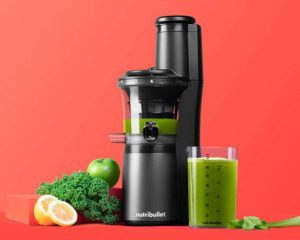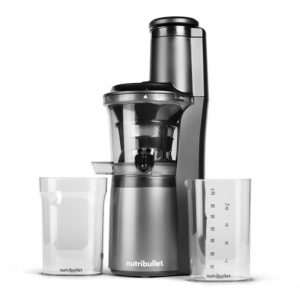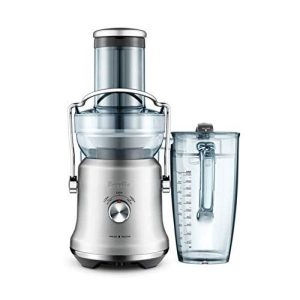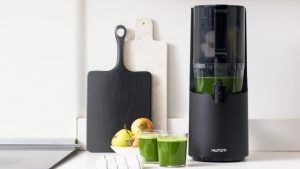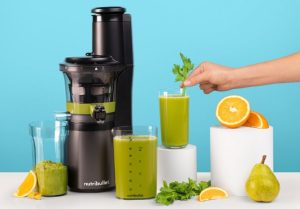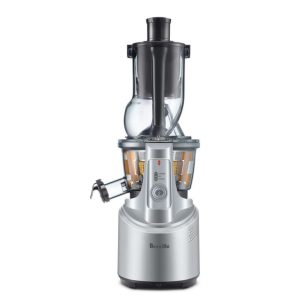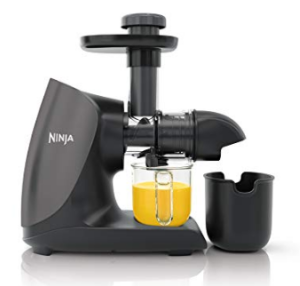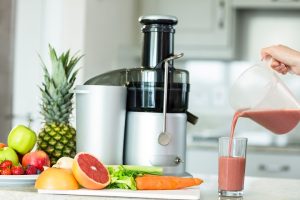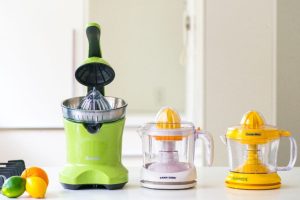The Slow crushing action helps extract the maximum nutrients from the vegetables, fruits and leafy greens input into the machine. Some claim that the cold press juicer offers a higher quality juice due to its pulp and extra nutrients. The slow juicer is much quieter than its fast juicing counterpart. In this page we talk about Best Slow Juicer | The Juicers for Healthy Drinks.
Contents
Best Slow Juicer:
Slow Juicers tend to be best for preserving the nutrients in fruits and vegetables. Slow juicers offer excellent juice quality and they are good for juicing a wider range of produce. Centrifugals win for convenience. Slow juicers are slow because of the design limitations of the process by which they juice.
Juicing is no healthier than eating whole fruits and vegetables. Juicing extracts the juice from fresh fruits or vegetables. The liquid contains most of the vitamins, minerals and plant chemicals found in the fruit. Whether you’re trying to get more nutrients into your diet or like to start your day with a big glass of greens, a good juicer makes it easy to whip up fresh-pressed produce in minutes.
Look for a juicer that has at least 400 watts of power to effectively juice the green leafy vegetables. In addition, you also need to consider how much juice you need in a day and depending on that choose a powerful juicer. These juicers tend to be a little more high-maintenance than centrifugal alternatives.
It’s widely believed that cold press juicers make the healthiest juice because they juice so slowly. They give fruits and vegetables time to break down and release their nutrients. As the name masticating suggests, the process mimics chewing, because it slowly and repeatedly breaks the food down before pushing it through a filter that separates the juice from the pulp.
- Quite operation.
- Great at Processing Leafy Greens.
- High Nutrient level and juice quality.
- Speed is 3X Lower Than a Fast Juicer.
- Expensive/Costly.
Features of a Slow Juicer:
- Simplicity.
- Noise.
- Variable speed.
- Efficiency.
- Reliability.
- Warranty.
- Number and quality of nutrients extracted.
- Easy to assemble and use, easy to clean. If you want to enjoy health benefits from juicing but you aren’t passionate, keeping it simple is the best route.
1: Juice Fountain Cold Plus:
If you hate prep work, the centrifugal Breville Juice Fountain Cold Plus is the juicer for you. It can fit a whole apple in its three and a half inch wide feed tube. Unique rivets on the top of the feed tube help position and guide ingredients into the juicer well. It juiced carrots and kale the fastest and was a top contender when it came to juicing apples.
Results all tasted sweet and pulp-free. The juicer’s dial is easy to use with helpful speed descriptors; slow for soft fruit, high for hard vegetables. The large, 70-ounce pitcher and heavy duty lid seemed like a bonus, perfect for serving extra large batches or storing leftovers.
Features:
- Large pitcher for Storage.
- Wide feed Tube.
- 70 Ounce Pitcher.
2: Hurom H200 Best Slow Juicer:
Hurom H200 Easy Clean Slow Juicer is another fantastic product from the brand. It’s part of their Easy Clean juice extractor product line. What’s impressive about it is it really works as advertised. It’s easy to assemble and disassemble, effortless to clean, yield more juice and retain a higher amount of nutrients.
Apart from being easy to use and clean, another unique feature of the Hurom H200 is its oversized chute. I don’t have the exact measurements. But it should be more than six inches in diameter. That’s double the size of whole slow juicers and centrifugal juice extractors.
Having a large feeding chute will reduce your prep time significantly. The only thing that’s stopping me from getting Hurom H200 is its price. It does require a significant amount of investment. By the end of the year, hopefully, this baby will be sitting on my countertop.
Features:
- Cute Design.
- A Mid price slow Juicer.
- Compact and Easy to Store.
- Two Strainers.
3: Nutribullet Slow Juicer:
We loved the NutriBullet Pro Juicer, so we were excited when the brand introduced its slow juicer model. As always, NutriBullet has been considerate in adding easy-clean features and a quality design.
The steel-tipped auger is durable enough to work through whole fruits and vegetables, and the motor is nice and gentle, which is perfect for those who want as much of a health benefit as possible.
You can remove most parts and put them through the dishwasher, which makes cleaning up a real breeze. The assembly was relatively straightforward, and compared to a lot of cold press juicers it was also easy to take apart after we were done. The auger was a little tricky to remove, not one for those who aren’t able to put their back into pulling it away from the machine.
Features:
- 24-oz Juice Cup & A Generous pulp container.
- No-Drip Spout.
- 7″ L X 6.25″ W X 17″ H dimensions.
- High juice output.
- Dishwasher-safe parts.
4: Big Squeeze Slow Juicer:
5: Ninja Cold Press Pro Juicer:
The Ninja JC101 Cold Press Pro is with it’s reasonable price point and easy to clean design. This is the best budget friendly cold press juicer on the market. It does struggle when compared to more expensive models when it comes to juicing though.
The chute is somewhat small and we had to chop our fruit quite finely to get an easy output. It’s also easier if you remove the skin from your apples before using this juicer, which can be annoying but does result in a very fibrous and nutritious juice.
Features:
- Dishwasher Safe Parts.
- Easy to Assemble.
- Three different filters.
- Color Coded and Easy to Switch Out.
- Adjustable.
Related Juicers:
1: Centrifugal juicers:
Centrifugal juicers juice much faster than slow juicers. Whole ingredients are typically dropped into the wider feed tube and pulverized at a very high speed.
For example, in our leafy greens test, 100 grams of kale juiced in as quickly as seven seconds. While it took upwards of one minute in the slow juicers. The juice from centrifugal juicers tends to come out a little foamy. But most come with lidded pitchers and built-in strainers so you’ll never taste the difference.
2: Citrus juicers:
Citrus juicers are the easiest to use and most streamlined, but they can only be used for citrus. They can easily be stored or remain on your counter because they take up minimal space. Citrus juicers also great for getting the most out of your lemons and other citrus fruits etc with minimal effort and unlike with a slow juicer or centrifugal juicer.
You don’t have to worry about peeling, segmenting or removing the seeds first. If you are juicing a lot consecutively, remember to empty the strainer periodically. The strainers are prone to build up which could translate into a slower and messier juicing process for you.
Conclusion:
The slow juicer is much quieter than its fast juicing counterpart. Slow Juicers tend to be best for preserving the nutrients in fruits and vegetables. Slow juicers offer excellent juice quality and they are good for juicing a wider range of produce. Slow juicers are slow because of the design limitations of the process by which they juice. These juicers tend to be a little more high-maintenance than centrifugal alternatives.
